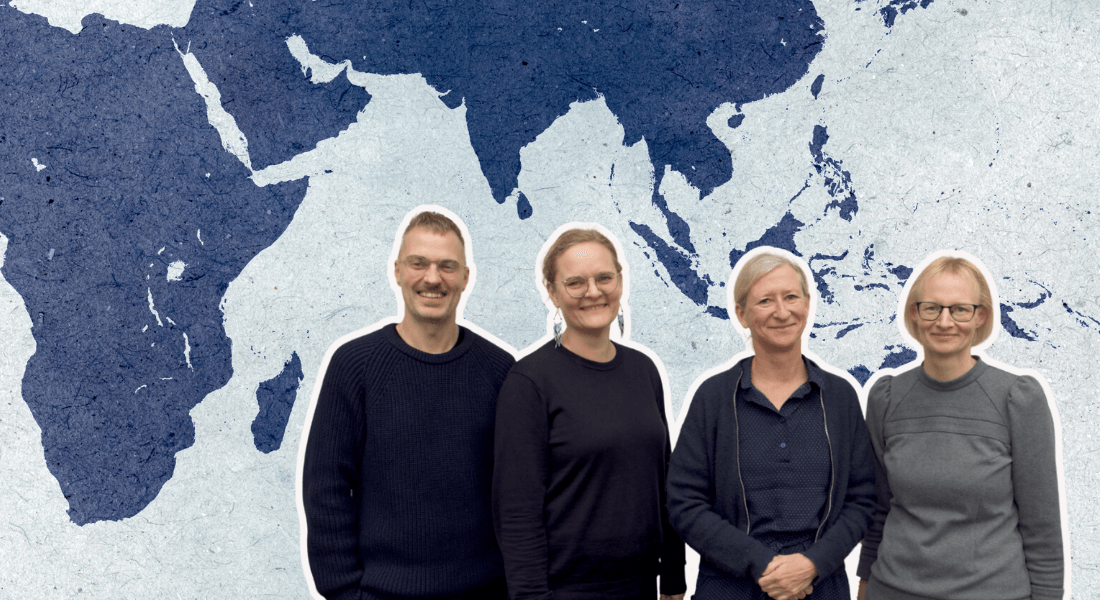University of Copenhagen awarded major grant to strengthen health professions education and reduce inequality in health
The Department of Public Health and the Centre for Online and Blended Learning at the University of Copenhagen have been awarded a DKK 52.9 million grant by the Novo Nordisk Foundation to co-develop health capacity in India and Kenya.

At the University of Copenhagen, the Department of Public Health and the Centre for Online and Blended Learning have been awarded a DKK 52.9 million grant by the Novo Nordisk Foundation to the project “Strengthening health professions education institutions in India and Kenya” as part of the Partnership for Education of Health Professionals (PEP) – an initiative that UCPH has been part of since its inception in 2022.
This five-year initiative will focus on collaborative capacity development with partners in India and Kenya to enhance health professions education systems, addressing pressing challenges such as the rising burden of cardiometabolic diseases, healthcare workforce shortages, and underserved populations.
Phase 1 laid a strong foundation for what we now aim to achieve —working closely with partners to create sustainable, scalable solutions.
The project builds on previous collaboration under PEP, where achievements included successful establishment of Centers of Excellence in India and trained faculty in digital and blended learning methods. Key achievements included the co-creation of digital learning resources, including the development of a Massive Open Online Course on cardiometabolic disease care, as well as collaborative mentorships in educational research.
Anne-Marie Mosbech Jensen, Head of Centre for Online and Blended Learning, says:
“Phase 1 of this collaboration demonstrated the transformative potential of co-designed, locally-driven initiatives. It laid a strong foundation for what we now aim to achieve —working closely with partners to create sustainable, scalable solutions.”
Expanding efforts to transform education
With this grant, the partners can deepen the collaborative approach, focusing on three core objectives.
First, it aims to develop partners’ capacities to integrate digital tools and innovative teaching methods into their study programmes with the ultimate goal of expanding access to quality education. Activities include co-training faculty in advanced pedagogical techniques, co-creating digital learning materials, and establishing sustainable teaching-learning units.
Second, the project emphasizes collaborative educational research, working with partners in India and Kenya to explore solutions to pressing educational challenges.
Finally, the project will address challenges in the transition between education and clinical practice, working with partners to ensure healthcare professionals are well-prepared for real-world demands.
Educational research collaboration and capacity development
Through collaborative health professions education research, the project seeks to advance educational research capacity at the partner institutions. The research will address critical challenges faced by medical and nursing colleges in Kenya and India, such as the digitalization of educational practices, reaching rural and remote areas, and the cultivation of sustainable educational research cultures.
We hope that this collaboration not only improves educational outcomes, but also provides institutions with tools to grow their research capacity and share their most successful educational practices with the world.
The initiative also emphasizes capacity building through exchange visits, co-supervision, workshop programmes, mentorships, and training opportunities. The effort is supported by a robust network of researchers and institutions, ensuring the sustainability and long-term impact of the initiative, explains Lasse Jensen, Assistant Professor at the Department of Public Health, University of Copenhagen.
“By addressing the unique challenges faced by health professions educators in India and Kenya, we hope that this collaboration not only improves educational outcomes, but also provides institutions with tools to grow their research capacity and share their most successful educational practices with the world,” he says.
Contextual research bridges education and clinical realities
A cornerstone of the PEP project will be a focus on contextual research to understand the lived realities of healthcare students and professionals in India and Kenya. Aim is to further understand challenges in the transition-phase from education to clinical practice and factors influencing workforce retention.
Jane Brandt Sørensen, Associate Professor at the Department of Public Health, University of Copenhagen, says:
“We aim to inform the development of educational tools by understanding the environments in which healthcare professionals train and work. By conducting in-depth, contextual studies, we can ensure that the solutions we co-develop address real-world challenges faced by both students and health care professionals.”
Gender equity is a key focus in this regard, addressing barriers that hinder the retention and advancement of women in healthcare leadership roles.
Through co-hosted workshops, joint research initiatives, and professional networks, aim of the project is thus to collaborate with partners in India and Kenya to lead transformative changes in health professions education. These efforts will not only benefit their healthcare systems but also serve as models for similar contexts globally.
Mette Ide Davidsen, Director of Global Health Programmes, NNF, is pleased to see the partnership advance.
“This partnership moves forward to establish strong international collaborations with the common goal of enhancing education of health professionals and ultimately reaching underserved populations in India and Kenya with adequate prevention and care for cardiometabolic diseases. Building the capacity of local education systems and creating global communities of practice among partner institutions ensure the sustainability of the programme beyond the project period,” she says.
By advancing digital innovation, fostering equity, and strengthening local leadership, the project exemplifies the power of collaboration in creating sustainable and meaningful change in global health education.
